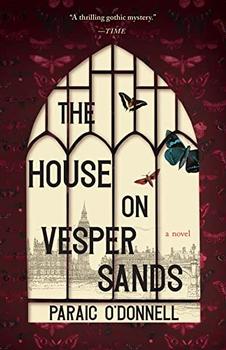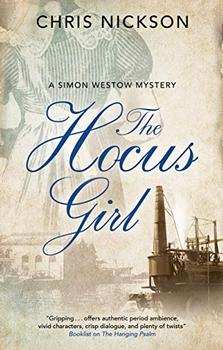Summary | Excerpt | Reviews | Beyond the book | Read-Alikes | Genres & Themes | Author Bio

Thomas De Quincey Mystery #3
by David MorrellAmateur sleuth Thomas De Quincey is back in a mystery set in Victorian England. This time, he and his daughter Emily are on the scene when the horrific crime—the first known murder on a train (see 'Beyond the Book') —is perpetrated. Their close friends, Scotland Yard detectives Ryan and Becker are called in, and using deductive skills that would make Sherlock Holmes proud, the quartet proceeds to track down the killer.
De Quincey (1785-1859), a real-life author and drug addict, is an inspired choice as a protagonist, and author David Morrell sticks quite closely to the historical figure. De Quincey's 1827 pamphlet, On Murder Considered as a Fine Art, graphically described a series of grisly crimes committed in 1811, and was the basis for Morrell's first book in this series, Inspector of the Dead. De Quincey also achieved notoriety for his 1821 volume, Confessions of an English Opium Eater, which shocked 19th century readers with its frankness.
Reader familiar with the previous two books in the series will recognize Morrell's technique. Once again he uses a historical crime that had profound societal reverberations as a springboard to highlight several issues commonly discussed in British society of the day, such as train travel, the stock market, the British participation in the Crimean War, and the country's political relationship with Russia. Also covered is the Victorian fascination with "water cures," spas in which various treatments—such as warm-water enemas—were used to purge the body.
The level of historical detail can't be beat. Although I've read many novels set in the Victorian period, I can't remember any that are as packed with information as Morrell's books, yet still remain entertaining. The author slips these points in with the action, so readers hardly realize they're getting a history lesson:
[He] showed his ticket to a guard and hurried along the waiting train, its hissing engine seeming to indicate impatience. He passed the third-class carriages in which passengers could only stand. Then came the second-class carriages with their hard benches. The social importance of wealthy passengers required them to take precedent and be at the front, even though that put them behind the noise and sparks from the belching engine...Each [first class carriage] had several compartments, and each compartment had its separate entrance…During daylight, he could ignore the other occupants by reading a newspaper that he'd purchased from the W.H. Smith bookshop in the station, but at night, the single lamp in each compartment wasn't sufficient to allow him to read.
Morrell is best known for his debut novel, First Blood (1972), which became the basis of the Rambo movie franchise, so it's not surprising that he writes action sequences expertly. Ruler of the Night contains several sensational scenes that had me flipping through the pages at high speed.
While this book works as a standalone, readers would be better served by starting with the first entry in the series. It's interesting to note how the author's style changes over the three novels; the first is slower-paced, much heavier on historical detail and concentrates on relaying De Quincey's life, while this one contains considerably more action and less historical information about its protagonist.
The series as a whole falls a bit short in the mystery department; in each case I found the denouement less than convincing and felt somewhat dissatisfied with the murderer's motives and actions. Hard-core mystery fans might find the books disappointing. However, historical fiction aficionados—particularly those interested in Victorian England—will very likely revel in the layers of detail in Ruler Of the Night.
Photo Essays
David Morrell has created four intriguing photo essays about the novel's locations which are available on his publisher's website:
Magnificent Euston Station
Wyld's Monster Globe
Illustrious Dove Cottage
Malvern's Bizarre Water-cure Clinic
![]() This review was originally published in The BookBrowse Review in January 2017, and has been updated for the
November 2017 edition.
Click here to go to this issue.
This review was originally published in The BookBrowse Review in January 2017, and has been updated for the
November 2017 edition.
Click here to go to this issue.

If you liked Ruler of the Night, try these:

by Paraic O'Donnell
Published 2022
With all the wit of a Jane Austen novel, and a case as beguiling as any in Sherlock Holmes' casebook, Paraic O'Donnell introduces a detective duo for the ages, and slowly unlocks the secrets of a startling Victorian mystery.

by Chris Nickson
Published 2020
Thief-taker Simon Westow must save one of his closest friends from a grim fate at the hands of the government in this compelling historical mystery.
Your guide toexceptional books
BookBrowse seeks out and recommends the best in contemporary fiction and nonfiction—books that not only engage and entertain but also deepen our understanding of ourselves and the world around us.